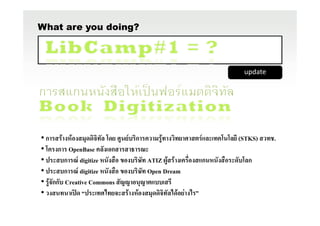1 of 7
Download to read offline







Ad
Recommended
Sharing Knowledge is power (Thai version)
Sharing Knowledge is power (Thai version)Maykin Likitboonyalit
?
?????????????????????? "3S ????????????????????????." ??? projectlibInnovation creative library for present
Innovation creative library for presentMaykin Likitboonyalit
?
Innovation creative library for present????????????????????????????????????????????????????????
????????????????????????????????????????????????????????Maykin Likitboonyalit
?
????????????????????????? 2562 ????????????????? ??????????????????????????? ??? ???????????????? ?????? Ī░??????????????????????????????????????????????Ī▒ (Professional Librarian Development and Disruptive Technologies)
?????? ????????????????? ??????????????????????????? ??????? ??????????????????????????? ????????????? 1 ????????? 2562 ????08.30 ©C 16.30 ?. ? ?????????? B603 ?????????????????????????????? ?????????? ???????????????????????????????????????????????????????????????????????????????????????????
??????????????????????????????????????????????????????????????????????????????Maykin Likitboonyalit
?
??????????????????????????? "??????????????????????????????????????????????????????????????????????????????" ?????? 25 ?????? 2561 ? ? ??????????????????????????????????? (e-Library)
????????????????????????????Prepare Yourself Before Library Working
Prepare Yourself Before Library WorkingMaykin Likitboonyalit
?
????????????????????? "???????????????????????????????????????????????????????" ?????? 12 ?????? 2560 ?????????????????????????????????????????????????????????????? ????????????????????????????????????????????????????????????????????? Thailand 4.0
??????????????????????????????????????????????? Thailand 4.0 Maykin Likitboonyalit
?
????????????????????? "??????????????????????????????????????????????? Thailand 4.0" ?????? 15 ????????? 2560 ???????????????????????????????????? Thailand 4.0
???????????????????????????????????? Thailand 4.0Maykin Likitboonyalit
?
????????????????????? "???????????????????????????????????? Thailand 4.0" ?????? 17 ??????? 2560 ? ???????????????? ???????????????Trends and Services in Modern Library
Trends and Services in Modern LibraryMaykin Likitboonyalit
?
?????????? "???????????????????????????????????????????" ?????? 6 ??????? 2560??????????????????????? ?????????????
??????????????????????? ?????????????Maykin Likitboonyalit
?
????????????????????? "????????????????????????????????????" ???????????? 20 ???????? 2560 ??????????????? ??????????????????Skill and Competency for Information Professional
Skill and Competency for Information ProfessionalMaykin Likitboonyalit
?
??????????????? "?????????????????????????????????????????" ??????????????????????? ???? ?????? 28 ?????? 2560????????????? ??????? ?????????????????????? ????????????????????????????????
????????????? ??????? ?????????????????????? ????????????????????????????????Maykin Likitboonyalit
?
?????????? ?????? "????????????? ??????? ?????????????????????? ????????????????????????????????" ??????????????????????????????????????
??????????????????????????????????????Maykin Likitboonyalit
?
The document discusses the future of library services with insights from a presentation by Mekhin Likhitboonrit on February 14, 2017, highlighting that libraries are essential and should adapt to modern user needs. It outlines top services like online research support, mobile access, and innovative lending kiosks, alongside emerging customer service trends that libraries should embrace. The focus is on enhancing user experience through personalization, convenience, and the use of technology such as AI and chatbots.Digital libraries with ict and innovation
Digital libraries with ict and innovationMaykin Likitboonyalit
?
Digital libraries are transforming traditional libraries through information and communication technology (ICT) and innovation. ICT has revolutionized the concept of libraries, with most libraries becoming digitized globally. A digital library comprises digital collections, services, and infrastructure to support lifelong learning, research, scholarly communication, and the preservation of recorded knowledge. Digital libraries provide advantages like no physical boundaries, round-the-clock availability, multiple access points, and preservation of information. However, they also face challenges like copyright issues, initial costs, and ensuring efficient access. Libraries must keep up with technology trends and adapt innovations appropriately to serve community needs.Information professioanl and me
Information professioanl and meMaykin Likitboonyalit
?
?????????????????????????????????????? ??? ??????????? ????????????? ???????????????????????????????????????????????? ???????????????????????????Work life balance with technology for digital era
Work life balance with technology for digital eraMaykin Likitboonyalit
?
????????????????????? "????????????????????????????????????????????????????????" ??????????? 29 ??????? 2559 ????????????????????????? 2559 ???????????????????? ????????????????????Trend for Library in 21st Century
Trend for Library in 21st Century Maykin Likitboonyalit
?
???????????? "Trend ??????????????????? 21 ????????????????" ?????? 11 ??????? 2559How to Libraries promote ICT Literacy to peoples in nation
How to Libraries promote ICT Literacy to peoples in nationMaykin Likitboonyalit
?
?????????? "????????????????????????????????????? ICT Literacy ???????????????????" ?????? 29 ?????? 2559 ? ?????????????? ??? ??????????? ????????????? Social media for business information management
Social media for business information managementMaykin Likitboonyalit
?
????????????????????? "????????????????????????????????????????" ????????? 4 ????????? 2558 ????????????????????? ?????????????????????????????? ??????????????????????
How to create blog library librarian
How to create blog library librarianMaykin Likitboonyalit
?
???????????? Blog ?????????????????????? ??? ????????????????????????????????????? (KM) ??? Projectlib / Libraryhub / THLibrary
Key for 21st century living library update
Key for 21st century living library updateMaykin Likitboonyalit
?
????????????????????? "???????????????????????????????????????????? 21" ?????????? ????????? ?????????????????????????? ?????? 29 ??????? 2558Key to success for 21st century living library
Key to success for 21st century living libraryMaykin Likitboonyalit
?
????????????????????? "???????????????????????????????????????????? 21" ?????? 21 ??????? 2558More Related Content
More from Maykin Likitboonyalit (20)
????????????????????????????????????????????????????????
????????????????????????????????????????????????????????Maykin Likitboonyalit
?
????????????????????????? 2562 ????????????????? ??????????????????????????? ??? ???????????????? ?????? Ī░??????????????????????????????????????????????Ī▒ (Professional Librarian Development and Disruptive Technologies)
?????? ????????????????? ??????????????????????????? ??????? ??????????????????????????? ????????????? 1 ????????? 2562 ????08.30 ©C 16.30 ?. ? ?????????? B603 ?????????????????????????????? ?????????? ???????????????????????????????????????????????????????????????????????????????????????????
??????????????????????????????????????????????????????????????????????????????Maykin Likitboonyalit
?
??????????????????????????? "??????????????????????????????????????????????????????????????????????????????" ?????? 25 ?????? 2561 ? ? ??????????????????????????????????? (e-Library)
????????????????????????????Prepare Yourself Before Library Working
Prepare Yourself Before Library WorkingMaykin Likitboonyalit
?
????????????????????? "???????????????????????????????????????????????????????" ?????? 12 ?????? 2560 ?????????????????????????????????????????????????????????????? ????????????????????????????????????????????????????????????????????? Thailand 4.0
??????????????????????????????????????????????? Thailand 4.0 Maykin Likitboonyalit
?
????????????????????? "??????????????????????????????????????????????? Thailand 4.0" ?????? 15 ????????? 2560 ???????????????????????????????????? Thailand 4.0
???????????????????????????????????? Thailand 4.0Maykin Likitboonyalit
?
????????????????????? "???????????????????????????????????? Thailand 4.0" ?????? 17 ??????? 2560 ? ???????????????? ???????????????Trends and Services in Modern Library
Trends and Services in Modern LibraryMaykin Likitboonyalit
?
?????????? "???????????????????????????????????????????" ?????? 6 ??????? 2560??????????????????????? ?????????????
??????????????????????? ?????????????Maykin Likitboonyalit
?
????????????????????? "????????????????????????????????????" ???????????? 20 ???????? 2560 ??????????????? ??????????????????Skill and Competency for Information Professional
Skill and Competency for Information ProfessionalMaykin Likitboonyalit
?
??????????????? "?????????????????????????????????????????" ??????????????????????? ???? ?????? 28 ?????? 2560????????????? ??????? ?????????????????????? ????????????????????????????????
????????????? ??????? ?????????????????????? ????????????????????????????????Maykin Likitboonyalit
?
?????????? ?????? "????????????? ??????? ?????????????????????? ????????????????????????????????" ??????????????????????????????????????
??????????????????????????????????????Maykin Likitboonyalit
?
The document discusses the future of library services with insights from a presentation by Mekhin Likhitboonrit on February 14, 2017, highlighting that libraries are essential and should adapt to modern user needs. It outlines top services like online research support, mobile access, and innovative lending kiosks, alongside emerging customer service trends that libraries should embrace. The focus is on enhancing user experience through personalization, convenience, and the use of technology such as AI and chatbots.Digital libraries with ict and innovation
Digital libraries with ict and innovationMaykin Likitboonyalit
?
Digital libraries are transforming traditional libraries through information and communication technology (ICT) and innovation. ICT has revolutionized the concept of libraries, with most libraries becoming digitized globally. A digital library comprises digital collections, services, and infrastructure to support lifelong learning, research, scholarly communication, and the preservation of recorded knowledge. Digital libraries provide advantages like no physical boundaries, round-the-clock availability, multiple access points, and preservation of information. However, they also face challenges like copyright issues, initial costs, and ensuring efficient access. Libraries must keep up with technology trends and adapt innovations appropriately to serve community needs.Information professioanl and me
Information professioanl and meMaykin Likitboonyalit
?
?????????????????????????????????????? ??? ??????????? ????????????? ???????????????????????????????????????????????? ???????????????????????????Work life balance with technology for digital era
Work life balance with technology for digital eraMaykin Likitboonyalit
?
????????????????????? "????????????????????????????????????????????????????????" ??????????? 29 ??????? 2559 ????????????????????????? 2559 ???????????????????? ????????????????????Trend for Library in 21st Century
Trend for Library in 21st Century Maykin Likitboonyalit
?
???????????? "Trend ??????????????????? 21 ????????????????" ?????? 11 ??????? 2559How to Libraries promote ICT Literacy to peoples in nation
How to Libraries promote ICT Literacy to peoples in nationMaykin Likitboonyalit
?
?????????? "????????????????????????????????????? ICT Literacy ???????????????????" ?????? 29 ?????? 2559 ? ?????????????? ??? ??????????? ????????????? Social media for business information management
Social media for business information managementMaykin Likitboonyalit
?
????????????????????? "????????????????????????????????????????" ????????? 4 ????????? 2558 ????????????????????? ?????????????????????????????? ??????????????????????
How to create blog library librarian
How to create blog library librarianMaykin Likitboonyalit
?
???????????? Blog ?????????????????????? ??? ????????????????????????????????????? (KM) ??? Projectlib / Libraryhub / THLibrary
Key for 21st century living library update
Key for 21st century living library updateMaykin Likitboonyalit
?
????????????????????? "???????????????????????????????????????????? 21" ?????????? ????????? ?????????????????????????? ?????? 29 ??????? 2558Key to success for 21st century living library
Key to success for 21st century living libraryMaykin Likitboonyalit
?
????????????????????? "???????????????????????????????????????????? 21" ?????? 21 ??????? 2558??????????????????????????????????????????????????????????????????????????????
??????????????????????????????????????????????????????????????????????????????Maykin Likitboonyalit
?
